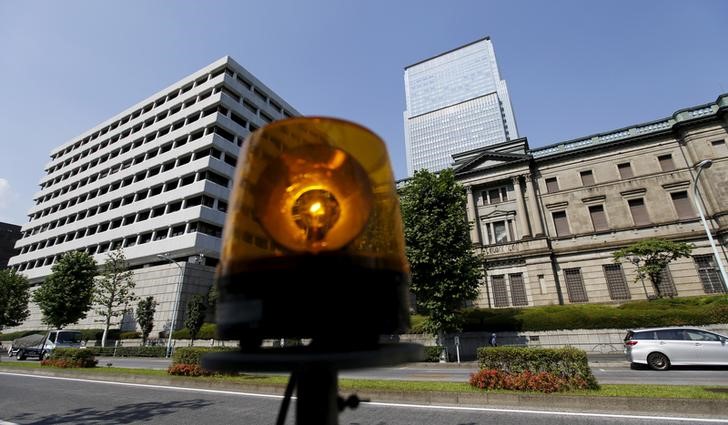By Kaori Kaneko and Sumanta Dey
TOKYO/BENGALURU (Reuters) - The Bank of Japan is expected to further ease its ultra-loose policies at this week's meeting, a Reuters poll of economists found on Tuesday, as it struggles to overcome chronic stagnation and quell speculation that it is running out of options.
The economists polled Sept. 14-20 were largely split over whether the BOJ's next move would be to cut its negative interest rate even deeper, or to ramp up or recalibrate its asset purchase programme, or even do both.
The BOJ's actions at its July meeting fell well short of market expectations, although it did announce the current review of the effects of its stimulus programme.
Twenty-one of 31 economists in the poll said the BOJ would announce further easing on Wednesday, while six said the next move would be announced at the review on October 31-November 1. Four picked some time in 2017.
Asked what the BOJ might do next, two-thirds of those who forecast more stimulus being announced on Wednesday picked a further deepening of the minus 0.1 percent interest rate as a possibility.
But several of them said changes to the BOJ's stimulus programme, such as buying more Japanese government bonds, adjusting the maturities of bonds eligible for purchase, boosting spending on commercial paper, corporate debt and exchange traded funds, were also likely.
Four respondents said the BOJ would only tweak details of its money-printing programme and would leave rates unchanged.
The consensus from the wider poll, which includes long-term forceasts from economists who did not have a specific call for this week's meeting, however showed no change to either the BOJ's negative interest rate or its asset purchases before year end.
Some poll participants wanted to see the results of the review before they would form a view on the timing of more stimulus.
Separately, analysts at BNP Paribas (PA:BNPP) wrote: "To quash talk that its arsenal is empty, at its September meeting, the BOJ may opt to stop targeting the monetary base, set a wider target range for JGB buying, and purchase JGBs at the upper end of that range for the time being to dispel notions of tapering."
TEPID INFLATION VIEW
The BOJ stunned markets in January when, in a split-vote, it decided to charge commercial banks 0.1 percent on a small portion of reserves they keep at the central bank - an unpopular move among banks because it hurts their earnings.
Japan's finance industry continued to lobby against any deepening of negative interest rates by the central bank, with the head of the life insurance lobby warning on Friday that rate cuts would do more harm than good to the economy.
"Expectations for beating deflation have receded further recently as the BOJ's own consumer price index is slowing down. And pressure on the yen to appreciate remains strong," said Takumi Tsunoda, senior economist at Shinkin Central Bank.
"It is possible that the BOJ will lower its negative rates further and shift its JGB buying to short- and medium-term bonds."
The BOJ's actions so far have done little to raise household inflation expectations. The poll found core consumer price index (CPI), which includes oil products but excludes volatile fresh food prices, was likely to be 0.2 percent on average in the fiscal year to March and then rise to 0.6 percent next fiscal year.
That is a fraction of the BOJ's inflation target of 2 percent. Some analysts in a poll last month expected the BOJ would use the review to abandon setting a specific timeframe in which to achieve its inflation goal.
The poll also found the economy was likely to expand an annualised 0.7 percent in the third quarter and 0.6 percent in the final quarter this year.
